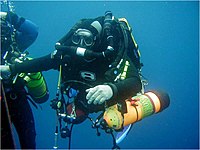
The development of an intermediate‐duration tag to characterize the diving behavior of large whales
Sign Up to like & getrecommendations! Published in 2017 at "Ecology and Evolution"
DOI: 10.1002/ece3.2649
Abstract: Abstract The development of high‐resolution archival tag technologies has revolutionized our understanding of diving behavior in marine taxa such as sharks, turtles, and seals during their wide‐ranging movements. However, similar applications for large whales have… read more here.
Keywords: diving behavior; large whales; duration; tag ... See more keywords

Diving behavior in a free‐living, semi‐aquatic herbivore, the Eurasian beaver Castor fiber
Sign Up to like & getrecommendations! Published in 2018 at "Ecology and Evolution"
DOI: 10.1002/ece3.3726
Abstract: Abstract Semi‐aquatic mammals have secondarily returned to the aquatic environment, although they spend a major part of their life operating in air. Moving both on land, as well as in, and under water is challenging… read more here.
Keywords: depth; diving behavior; bottom phase; duration ... See more keywords

Ancient whale rhodopsin reconstructs dim-light vision over a major evolutionary transition: Implications for ancestral diving behavior
Sign Up to like & getrecommendations! Published in 2022 at "Proceedings of the National Academy of Sciences of the United States of America"
DOI: 10.1073/pnas.2118145119
Abstract: Significance Many cetacean species can dive to extraordinary depths on a single breath, but the evolutionary origins of deep-sea foraging in ancestral cetaceans remain unclear. We present a resurrected ancestral cetacean visual protein (rhodopsin) to… read more here.
Keywords: ancient whale; rhodopsin; whale rhodopsin; diving behavior ... See more keywords

Diving Behavior and Fine-Scale Kinematics of Free-Ranging Risso's Dolphins Foraging in Shallow and Deep-Water Habitats
Sign Up to like & getrecommendations! Published in 2019 at "Frontiers in Ecology and Evolution"
DOI: 10.3389/fevo.2019.00053
Abstract: Air-breathing marine predators must balance the conflicting demands of oxygen conservation during breath-hold and the cost of diving and locomotion to capture prey. However, it remains poorly understood how predators modulate foraging performance when feeding… read more here.
Keywords: diving behavior; water; risso dolphins; kinematics ... See more keywords